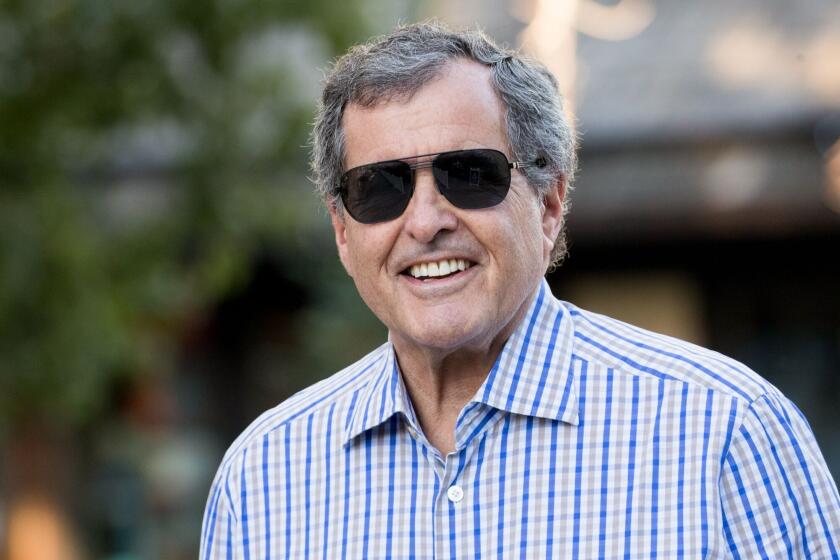Milken Lied About Deal, Former Chief of Drexel Implies
- Share via
NEW YORK — Frederick H. Joseph, Drexel Burnham Lambert’s former chief executive, confronted Michael Milken in court Tuesday for the first time and implied that Drexel’s longtime star employee had lied to him.
Joseph also seemed to damage Milken’s case in pre-sentencing hearings by stating that Milken had violated written company rules on ethics. The Drexel executive said Milken had done so by giving managers of mutual funds and some company executives improper personal investment opportunities in a deal involving highly valuable Storer Communications warrants.
“We had a policy that you could not give favored treatment to employees of institutional investors accounts” at Drexel, Joseph said. Referring to distribution of Storer warrants, he said: “I think it violated that rule.”
Joseph currently is vice chairman of Drexel, now in bankruptcy proceedings. The firm collapsed less than a year after Joseph, based at the firm’s New York headquarters, had it plead guilty to six felony counts, all relating to Milken transactions. At the time of Drexel’s plea, Milken supporters considered Joseph’s decision a major betrayal.
But now Milken himself has pleaded guilty to six counts. The hearings are being held to determine if there is evidence that Milken committed other crimes besides the six. U.S. District Judge Kimba M. Wood said she will consider the evidence in deciding Milken’s sentence. He faces up to 28 years in prison.
The court appearance was the first time in about a year that Joseph and Milken had met face to face, a source said. It proved to be a less-than-epic confrontation, however: Milken betrayed no emotion in response to Joseph’s testimony. And Joseph didn’t heap blame on Milken for the firm’s fate. He simply answered the relatively narrow factual questions that were put to him.
The testimony centered on the distribution of the Storer warrants that were generated as part of Kohlberg Kravis Roberts & Co.’s leveraged buyout of Storer in 1985. Drexel handled the financing. Prosecutors argue that Milken secretly arranged for 80% of the warrants to go into a private employee partnership that he controlled. They also charge that Milken used the warrants to personally bribe investment fund managers and others into having their funds or companies buy risky Storer preferred stock that did not pay cash dividends.
Joseph implied that Milken had lied to him about the use of the warrants. Joseph said that in the spring of 1988, a senior official of the Keystone group of mutual funds expressed concern to him that Drexel might be involved in unethical activity by allowing employees of investment funds to invest personally in lucrative private partnerships established for Milken and other executives of Drexel’s high-yield bond department. Joseph said he then called Milken and asked if this were true.
“I asked him if any fund managers were in any of (the Drexel employee) partnerships,” Joseph said. “He said to the best of his recollection ‘No.’ ”
Joseph said he later learned that this wasn’t true. He said Craig Cogut, a lawyer who worked for the Beverly Hills-based junk bond department, came to him a short time later. He said Cogut told him there was a Milken-controlled partnership “that the firm was unaware of and that the investors included some fund managers for their own account in situations where the funds they had managed had purchased (Storer) preferred.”
In a separate development, the judge seemed to hint that she would like to see Milken himself testify. She indicated that she hadn’t decided yet whether she will hold it against him if he doesn’t. Defense lawyer Arthur L. Liman said he was concerned that whatever Milken says might be used against him in criminal proceedings filed by state authorities. He said Milken probably won’t testify unless he gets blanket immunity. Milken already has immunity from federal prosecution.
One other witness testified Tuesday, providing the first testimony directly linking Milken to offering the warrants as personal investments to favored corporate executives. Richard Grassgreen, who this week agreed to plead guilty to two felony counts, said Milken had called to offer him some of the warrants.
Grassgreen is former chairman of Enstar Group Inc. and its predecessor, Kinder-Care. He said, however, that Milken offered him the warrants well after Kinder-Care had committed to buying the preferred and that there was no connection to that investment decision. He said neither Milken nor any other Drexel employee ever tried to use the Storer warrants improperly to pressure him.
“All of the investments that were made during the time I managed the (Kinder-Care investment) portfolio were made on the merits and were very profitable,” Grassgreen said.
More to Read
Inside the business of entertainment
The Wide Shot brings you news, analysis and insights on everything from streaming wars to production — and what it all means for the future.
You may occasionally receive promotional content from the Los Angeles Times.










